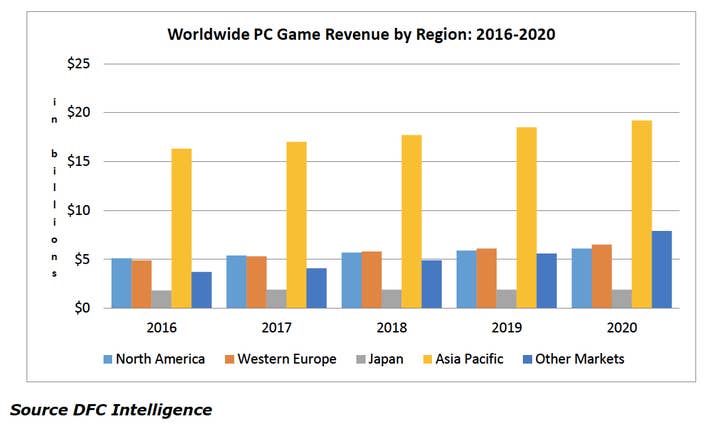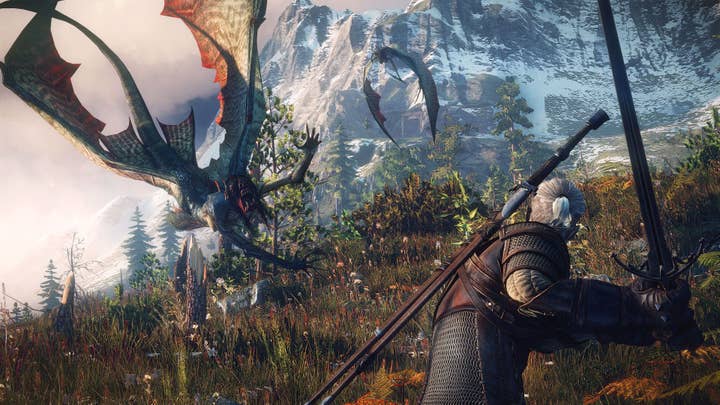PC games revenue to hit $42 billion in 2020 - DFC
Research firm sees market in the West driven by core gamers as games-as-a-service model cools
DFC Intelligence has released a new report on the global PC gaming market, which forecasts game software revenues to climb to $42 billion by 2020. The market reached a record high of $30 billion in 2015 (up 11% over 2014), "via a combination of retail sales, subscriptions, virtual item sales, advertising and digital distribution revenue."
Interestingly, while games-as-a-service remains the dominant model throughout Asia on the PC, DFC says that the model has cooled here in the West (North America and Europe). Part of the reason for this is that browser and social network based free-to-play games have shifted over to mobile, and at the same time the PC platform has seen more core gamers adopting a handful of premium (pay upfront) titles, such as The Witcher 3 or Cities: Skylines.
"The biggest growth drivers of PC games are what DFC defines as core and moderate PC gamers. There are an estimated 300 million consumers worldwide that fit this definition," DFC said. "A major growth opportunity is among moderate gamers that are likely to become core gamers when they gain more disposable income. In many cases these are children being introduced to PC games at an early age. As these consumers grow, a major portion of them are expected to significantly increase their spending on both gaming hardware and software."
It's important to recognize as well that from a software perspective, retail has never been less important on the PC than it is today. DFC found that retail revenue from sales of packaged PC game products was only $1.4 billion in 2015 and accounted for less than 5% of total PC game revenue.

In terms of geographies, China is still the dominant force in PC gaming - for the eigth year in a row. China brought in $12 billion in PC gaming revenue in 2015 (up 20% over 2014). The US comes in at a distant second with $4.2 billion, and that's with strong growth of 10% in 2015. The third, fourth and fifth spots are occupied by South Korea ($2 billion), Japan ($1.8 billion) and Germany ($1.4 billion).
Here are 10 key PC gaming trends that DFC has outlined for 2015/2016:
- An increased diversity of game types and business models.
- A small number of major new launches including Grand Theft Auto V, Overwatch, Cities: Skyline and The Witcher 3.
- More AAA titles are starting to release for both console and PC.
- Thriving Multiplayer Online Battle Arena (MOBA) games led by Dota 2, League of Legends and Heroes of the Storm and top first-person shooters like Counter- Strike Global Offensive are driving healthy growth of eSports tournaments.
- Virtual reality has gained a great deal of media attention and should drive spending on PC game hardware that could lift the entire PC game market.
- Much attention in China and Asia was on growth in mobile games in 2015. This was especially true of Netease who took some major PC franchises to mobile and saw significant revenue growth. However large Chinese companies like Tencent saw 14% growth in their PC games division in 2015.
- Many Western games are doing well in China via companies like Tencent and Netease. These include World of Warcraft, Hearthstone, Warcraft, StarCraft II. and Diablo III.
- There is increasing synergies between mobile games and PC games where gamers can play the same game across multiple platforms.
- The market for games from smaller developers (indies) continues to grow via distribution services like Steam. The indie game movement can be seen as the new form of "casual" game as traditional casual games have increasingly gone to mobile platforms.
- Windows 10 did not have a major impact on PC games either positive or negative.

